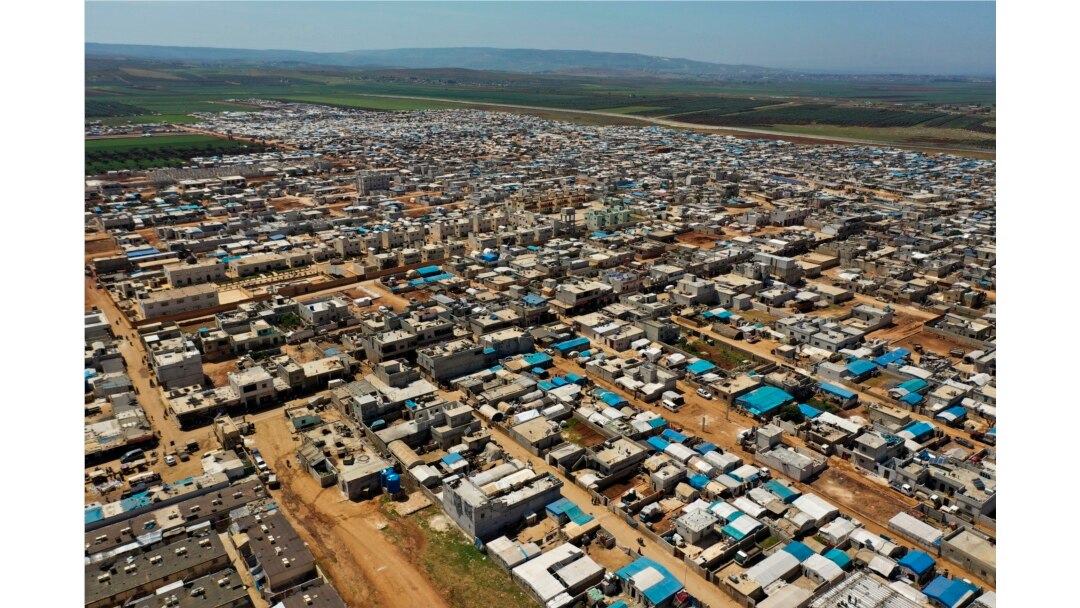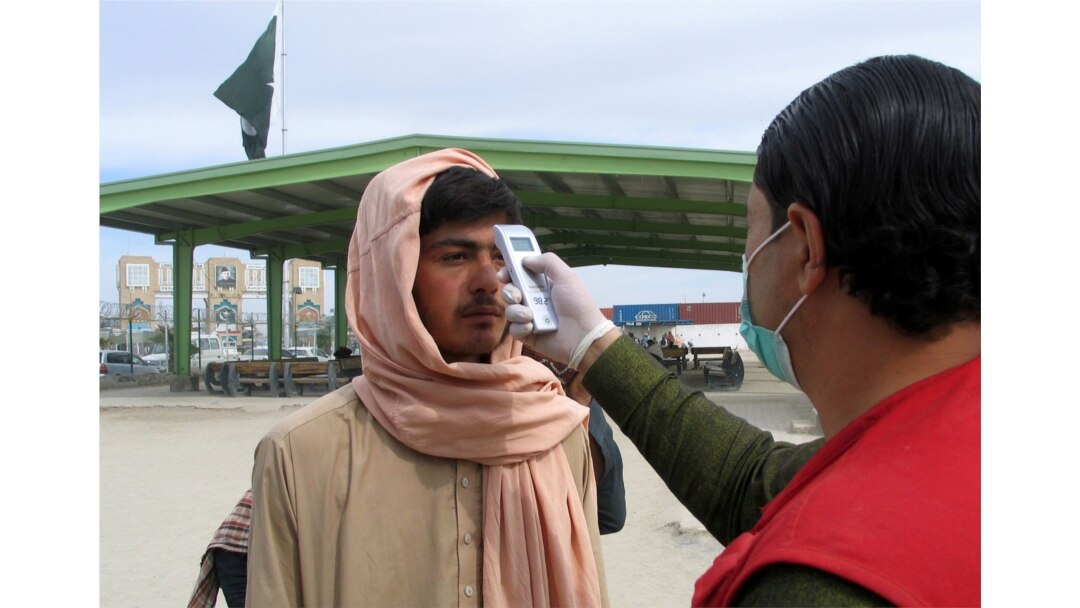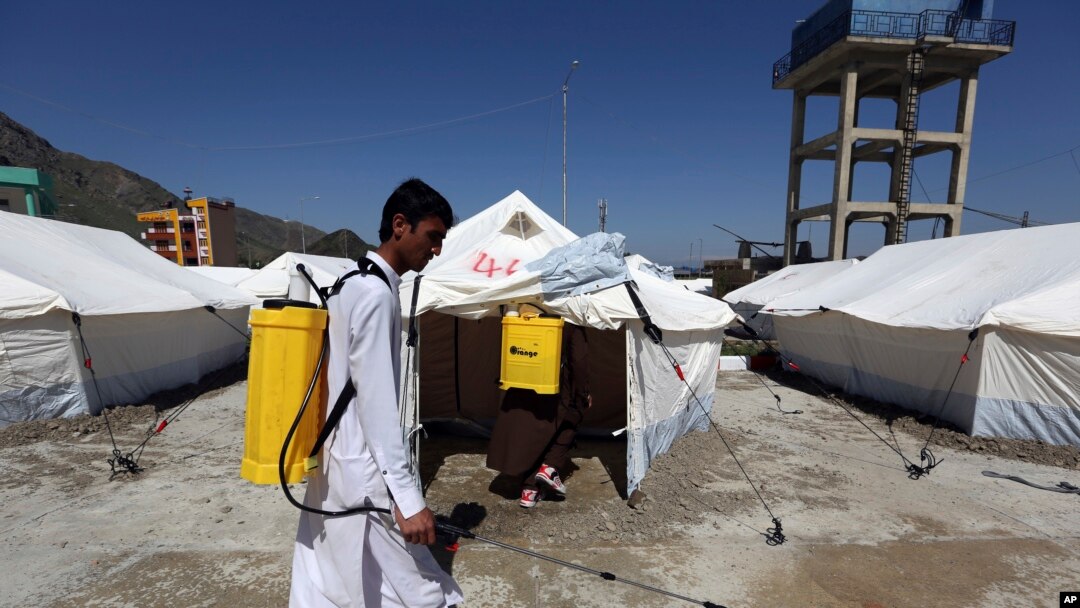The International Rescue Committee warned Tuesday of up to 1 billion COVID-19 cases and 3.2 million deaths in 34 countries that are confronting crises or at war, including Afghanistan, Syria and Yemen.
The IRC said an analysis of “potential response scenarios” found COVID-19 could cause between 500 million and 1 billion infections and between 1.7 and 3.2 million fatalities in those vulnerable countries.

This April 19, 2020 photo shows a large refugee camp on the Syrian side of the border with Turkey, near the town of Atma, in Idlib province, Syria.
“These numbers should serve as a wake-up call,” said IRC President and CEO David Miliband. “The full, devastating and disproportionate weight of this pandemic has yet to be felt in the world’s most fragile and war-torn countries.”
Miliband said there is still time to “mount a robust preventative response” in many of the countries to “prevent a further perpetuation of this epidemic globally.” He added, however, that “urgent funding to frontline responses is needed.”
The IRC’s estimates, based on modeling and data from Imperial College of London and the World Health Organization, are preliminary and conservative.
A new report by the IRC warns that local approaches are needed to avoid “exacerbating humanitarian suffering” in those countries instead of a “one-size-fits-all” model.
Miliband called on donors, governments and emergency responders to “work together to remove any impediment to humanitarian assistance.”

FILE - A health worker takes the temperature of a Afghan national at the Chaman crossing point on the Pakistan-Afghanistan border, in Chaman, Pakistan, Feb. 26, 2020.
“Without immediate international action that supports the needs and unique challenges faced by people in these countries … the consequences will be the loss of life and livelihood on an appalling scale,” Miliband declared.
In an interview with Sky News, Miliband, a former British member of parliament, urged the world’s wealthiest countries to help the most vulnerable nations.
He accused the G20, a global forum for the governments and central banks from the 19 counties and the European Union, of being “in a slumber” in its global response to the pandemic. Miliband also attacked U.S. President Donald Trump for making a “completely retrograde” move in suspending funding to WHO for 60 days.
Meanwhile, the head of the Japan Medical Association said Tuesday it will be difficult for the country to host the rescheduled Olympics next year without a coronavirus vaccine available.
FILE - A man wearing a face mask walks passed a billboard with the logo of the Tokyo 2020 Olympics, in Tokyo, Japan, April 2, 2020.
"I am not saying that Japan should or shouldn't host the Olympics, but that it would be difficult to do so," said Yoshitake Yokokura. "Unless an effective vaccine is developed, I expect hosting the Olympics will be difficult."
The pandemic forced organizers to abandon plans to hold the games this July, opting instead to postpone the event that draws thousands of athletes from all over the world.
Multiple countries are currently working on developing vaccines, but experts have cautioned the process to test both the safety and effectiveness of vaccine candidates, plus manufacturing doses, could take 12 to 18 months.
The coronavirus outbreak has prompted officials to put billions of people under various stay-at-home orders and tell non-essential businesses to close their doors.
The result has been increases in unemployment, massive revenue cuts and governments balancing the need to stop the spread of the virus with economic concerns. Some have enacted financial rescue packages to help put money in people’s pockets and keep businesses afloat.
Mark Lowcock, the U.N. Humanitarian Affairs Emergency and Relief Coordinator, address United Nations Security Council with a report on Yemen, Tuesday Oct. 23, 2018 at U.N. headquarters.
U.N. humanitarian chief Mark Lowcock suggested a $90 billion effort to help provide income, food and health aid for the world’s most vulnerable people at a time when experts say the pandemic has not yet reached the poorest parts of the planet.
He said there are 700 million people in 30 to 40 countries that had been receiving some level of humanitarian assistance and will see incomes drop as increased infections force lockdown measures.
“What I am suggesting is a lot of the suffering and loss of life can be contained within sums of money which are imaginable,” he said.
Lowcock said funding could come from a combination of international institutions, such as the World Bank and International Monetary Fund, as well as one-time boosts in contributions from governments.
Director-General of World Health Organization Tedros Adhanom Ghebreyesus attends a news conference on the outbreak of the coronavirus disease (COVID-19) in Geneva, Switzerland, March 16, 2020.
World Health Organization Director-General Tedros Adhanom Ghebreyesus urged European countries that are easing their lockdowns because of declining numbers of new cases to “find, isolate, test and treat all cases of COVID-19 and trace every contact, to ensure these declining trends continue.”
His comments followed easing of restrictions in Italy, Spain, Germany and elsewhere.
Health officials in the Chinese city of Wuhan, where the virus originated, said Tuesday there were no new cases and that there were no remaining coronavirus patients in its hospitals for a second consecutive day.
Confirmed cases of coronavirus worldwide have surpassed 3 million, and fatalities have exceeded 212,000, according to Johns Hopkins University statistics.


